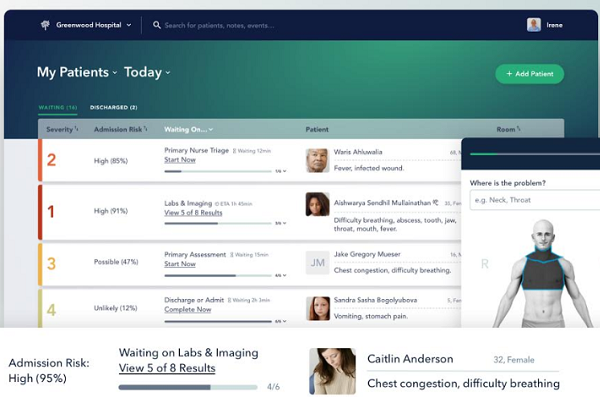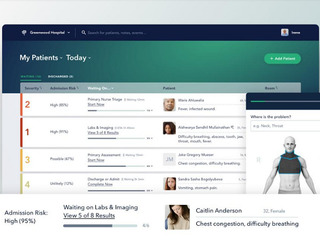
In 2009, President Obama signed the American Recovery and Reinvestment Act (ARRA) in order to help stimulate the economy out of the Great Recession. Part of that included the The Health Information Technology for Economic and Clinical Health (HITECH) Act, which earmarked tens of billions of dollars for hospitals to start using electronic medical records and electronic health systems, making it easier to store and share data.
While that investment has resulted in some benefits, including a huge amount of data, which is now growing at a rate of 48 percent annually, it also had some unintended consequences.
“Whatever software existed in 2008 and 2009 has been frozen in time. Companies invested in simply getting it installed, rather than improving the core experience. They were behind to begin with. Now, the software that $1.3 trillion of US healthcare spending goes through literally looks like Windows 98 software, and it largely is,” explained Aaron Patzer, founder and CEO of Vital, a company that uses AI to assist hospital emergency departments with coordinating care.
That lack of new technology is impacting both patients and doctors, resulting in increased emergency room patients wait times, which can be over eight hour in some places, while doctors spend two hours in their electronic health records software for every hour with patients, plus another 1.5 hours at home.
The mission of Vital to not only cut wait times in half but “save doctors and nurses from the burn-out and horrible inefficiency caused by using old Windows software.”
On Wednesday, the company announced a $5.2 million seed round led by First Round Capital and Threshold Ventures (formerly DFJ Venture). The round also included participation from Bragiel Brothers, Meridian Street Capital, Refactor Capital, and SV Angel, with angel investment from Vivek Garipalli, CEO of Clover Health; and Nat Turner and Zach Weinberg, founders of Flatiron Health. Prior to this round, the only money Vital had raised was $1 million of his own money that Patzer had invested in to fund the company for the first couple of years.
In addition to the funding, it was also announced that Josh Kopelman, founder and partner at First Round Capital, will be joining the board of directors at Vital.
“I’ve worked with Josh on three companies now, and known him for 12 years. He’s one of the most experienced operators, having started a number of companies, and wisest investors I know. He’s been deep into health tech for the last few years with FlatIron Health and Patient Ping, among others,” Patzer told me.
“He remains the perfect first board member for all of these reasons. Plus the whole First Round team and community are pretty much unbeatable for early-stage support, recommendations, and advice.”
Vital’s constituents
The typical customer for Vital is a health system with anywhere between five and 50 hospital emergency rooms, and Patzer counts three major constituents that the company caters to, the first being the patients.
“A visit to the ER is likely one of the worst days of a patient’s life. Yet at many hospitals, patients can wait for hours before seeing a doctor or receiving treatment, with little information about what’s going on behind the scenes or why they are waiting so long,” he said. “Vital keeps patients informed about ER wait times and next steps on their own mobile device. Vital also keeps patients safer using artificial intelligence to predict which waiting room patients may be most at risk.”
The second constituency for Vital is the doctors and nurses; it allows them to take notes on a tablet, search patient records like using Google and review patient health history in a glance. Finally, there are the hospitals themselves, who Patzer says can save millions of dollars per facility by using Vital’s platform.
“Vital uses AI to identify lower-acuity patients who can be fast-tracked, saving up four hours of hospital time. Another algorithm helps hospitalists prepare for likely admits hours in advance. Automatic workflow analysis identifies bottlenecks in equipment, process, and providers to move patients through the ED faster.”
Right now, Vital is piloting at four hospitals, and the company will use this funding largely for the continued development of its product.
“We’re competing against major EHR vendors who are usually 5,000 to 20,000 employees,” Patzer said, though he also noted there are no other startups that are tackling the problems of the core hospital EHR and EMR systems right now.
“Our competitors would be Epic, Cerner, Allscripts, McKesson, and Athena who are the major players in the industry, with the exception of Athena, who is a bit more outpatient care than inpatient hospital care anyways. All our competition’s code bases started in the 1970s,” he told me.
“Vital is building a modern EHR, with modern technologies, like mobile, search, AI, good UI/UX, designed by emergency room physicians and nurses specifically for the emergency room. It’s faster and easier to use. It saves time and makes information accessible and actionable.”
Vital’s founding story
Patzer is best known as the founder and CEO of Mint.com, which he sold to Intuit for $172 million back in 2009. Now he is taking what he learned in the fintech space and applying it to healthcare.
The idea for Vital came from his co-founder, and brother in law, Dr. Justin Schrager, he said, who he saw spending hours every day using “an archaic looking system.”
“Since I have a background in making complex things, like Quicken, into simpler, easier software, like I did with Mint, it was a good fit to partner on this project. Just like Mint, with categorizing financial transactions, and Fountain, with matching to the right expert by understanding questions, Vital involves real-time AI and natural language processing algorithms,” he explained.
While there are similarities between the two spaces, Patzer does acknowledge that there are some fundamental differences as well, and that healthcare will likely be more difficult to tackle.
“This is a complex, hard, long-slog sort of area. Mint launched and was acquired two years to-the-day later for $172 million. Things will take a bit longer here, but the opportunity is larger. And so is the impact. One day, I’d like to look back, and say, even if it can only be proven statistically, that we saved thousands of lives.”
In the long-term, he does expect to eventually broaden Vital’s technology to more aspects of the healthcare system beyond the emergency room.
“Right now, Vital is really good as a patient-facing system, providing mobile check-in and wait time updates throughout the patient journey. It’s great for nurse note-taking, triage, and for everyone to see what’s likely to happen next. But the emergency room is complex. It will take another few years to tackle it perfectly. That will likely mean integrating with EMS and ambulances and, perhaps, 911 services, along with going deeper into the hospital. Long term, we’d like to expand into other areas of the hospital.”






















